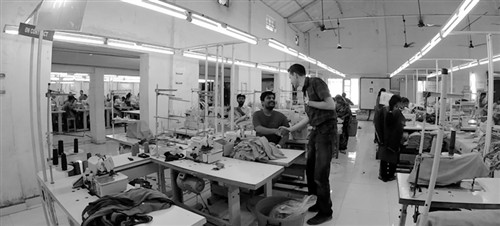A fair price for fashion
A deadly factory collapse in Bangladesh shocked a member of Headington Baptist Church so much he decided to take radical action. By Fiona Spence
It’s 8am on a densely-crowded Bangladesh street. Thousands of workers are refusing to enter their place of work, a multi-storey factory housing five textile businesses. Alarming cracks have appeared in the walls and people are scared for their safety.
The owner, ignoring the fears of the workers, hires men with sticks to beat the crowd and force them into the building. The labourers, mainly female, are told that if they do not work today they will not be paid for the whole month. How will they feed their children? Reluctantly, the crowd give up their protest and go to work. Forty five minutes later the building disintegrates with thousands of workers trapped inside.
This is the tragic story behind the collapse of the Rana Plaza. On 24 April two years ago, hundreds of textile workers died and over 2,500 were injured. Some 1,137 were confirmed dead, many more are still missing. Nearly one third of those who had tried in vain to voice their rights that day, to secure something that we take for granted – the right to a safe working environment – died.
The name Rana Plaza has gone down in history as the deadliest disaster, to date, of the garment industry worldwide.
Many of us watched the news that day, saddened at the lives lost, angry at the Western brands who contracted the making of our clothes to business owners who cut corners and made their workers endure 100 hour weeks. Surely the fashion industry must have known.
Andy Showell-Rogers who attends Headington Baptist church in Oxford was one of those who sat, shocked and perplexed, watching the tragedy unfold on TV. But for him, the story didn’t stop there. It prompted a remarkable course of action that has brought fairness and security to the lives of many textile workers in developing countries.
When I saw the collapse of Rana Plaza I felt enough was enough - this can't carry on
“On TV we can see so much suffering, we can feel ‘what can I do?’” says Andy. “This leads to inaction because one person can’t solve everything. But when I saw the collapse of Rana Plaza I felt enough was enough – this can’t carry on.”
That day he and two friends made a decision to find out how easy it would be to only wear clothes that reflected their values. So Andy liberated his wardrobe of its contents, including underwear and socks, and set out on a mission to only buy and wear ethically-sourced products.
“We didn’t know how difficult it would be,” says Andy. “We wondered if it would even be possible to find one complete outfit.”
They charted their clothing challenge on a blog – whomademywardrobe. They reviewed products and promoted brands who are transparent.

“We wanted fairness to be part of their DNA,” explains Andy. “We wanted to be confident that the people making the decisions in these businesses know that the people making their clothes are being treated fairly. But it was really difficult to find many companies like this.”
Not only was it hard to find ethically-produced clothes but the items they did find were often expensive. “We found a lot of high-end fashion stuff. We were willing to pay a bit more but there just wasn’t much to find so we ended up with a very limited wardrobe!”
This frustration led to the realisation that there was a gap in the market for affordable, ethically-sourced clothes that people would want to wear. So the guys set out to change people’s expectations – could they sell t-shirts or shirts that looked good, that were quality products, made by skilled tailors in developing countries who were paid a fair price for their work, tailors they had met and knew the names of?
A crowdfunding campaign enabled Andy to embark on making this dream a reality. Several overseas trips later, Visible Clothing was launched.

“I went to India and visited a number of factories,” says Andy, who now works full-time as CEO of Visible. “The one we selected has fairness at its core. I sat down with the owner. She wants to have a positive impact in the community. This factory makes the t-shirts.”
Along with T-shirts, Visible Clothing sells ties and shirts made in Vietnam where they work with Fashion and Freedom, a company that provides training to individual tailors on how to build up their contacts and develop their business.
I asked people in the factories what they wanted people to know about them. Many of them said they are really proud of their work
What stands out about Visible Clothing is its goal of bringing the buyer much closer to the maker. Andy knows the people who labour over their sewing machines day after day, which such skill and attention to detail. On Visible’s website these master tailors have a face and a name, hopes and dreams, a life story.
“I asked some of the people in the factories I visited what they wanted people to know about them,” says Andy. “Many of them said they wanted people to know that they are really proud of their work. These people have opportunities for promotion, they have regular and secure income – this allows people to change their own lives.”
One of those who’s experienced transformation is Quan in Vietnam. When his wife became ill he had to sell his shop to pay for medical bills. Sadly, his wife died, and now he and his son share one room. They’re trying to rebuild their lives. But because he makes shirts for Visible he gets paid what he should get paid for a quality product. It is giving him and his son hope for the future.
Most people would agree that yes, we want people to be paid fairly for the work they do. But walk down any high street and there’s a plethora of faceless corporations selling cheap, fashionable clothing, offering bargains that can be too tempting to resist. Perhaps the hardest thing about wanting to buy in-line with our values is that it can cost us. And, for many of us, monthly budgets are already stretched.
The percentage of salary that we spend on clothes compared to 50 years ago is tiny but we've got loads more clothes
“I have way fewer clothes now,” Andy says. “It’s a mind-set shift. I don’t need to buy them regularly. The percentage of salary that we spend on clothes now compared to 50 years ago is tiny but we’ve got loads more clothes. I love a bargain and I understand that the reality of financial pressure is significant. I think we need to look at this in a different way. We need to think ‘maybe I need less’. The pressure on factories to keep up with the volume of clothes we demand and the ever-changing fashions is huge.”
Aside from seeking out fairly-made clothes, it’s possible to effect change using the clothes we already have. There’s a growing community of people who are determined to take on the big brands, to challenge them about their ethics and business practices. On 24 April 2015 a Fashion Revolution day will commemorate the lives and livelihoods lost in the Rana Plaza disaster by encouraging people to ask the big high street names – who made my clothes? Joining in the action is fairly simple – take a selfie showing the label on your clothes, tag the brand and ask #whomademyclothes?
For Andy, change, or at the very least challenging big business, is essential: “We can give money to charity in one hand and then take it back again by causing suffering in another way,” he says. “And clothes are such a part of our identity; it can be challenging to change in this way.”
But change we must, before Rana Plaza is forgotten and another building collapse takes the title of ‘biggest textile industry disaster in the world’.
Fiona Spence/Baptist Times, 20/04/2015